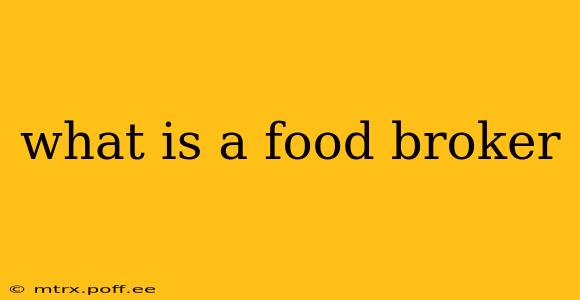The food industry is a complex network of producers, manufacturers, distributors, and retailers. But nestled within this intricate web are the often-overlooked, yet vital, food brokers. So, what exactly is a food broker? Simply put, a food broker acts as a sales representative for food manufacturers, connecting them with buyers like retailers, restaurants, and food service companies. They don't own the products they sell, and they don't handle shipping or logistics. Instead, their primary role is to facilitate sales and build mutually beneficial relationships.
Think of them as matchmakers in the food world, bringing together the right products with the right buyers. Their expertise lies in understanding market trends, identifying potential clients, and negotiating deals that benefit both the manufacturer and the buyer.
What Does a Food Broker Do?
Food brokers perform a variety of critical functions, including:
-
Identifying Potential Buyers: Brokers have extensive networks of contacts within the food industry. They actively seek out potential buyers who would be interested in their clients' products, considering factors like location, target market, and purchasing patterns.
-
Negotiating Sales: Once a potential buyer is identified, the broker acts as a liaison, negotiating pricing, terms, and contracts to secure the sale. They are skilled negotiators, aiming to achieve the best possible terms for their manufacturer clients.
-
Market Research and Analysis: Brokers stay abreast of current food industry trends, consumer preferences, and market demands. This knowledge helps them strategically place products and target buyers who are most likely to purchase them.
-
Building Relationships: Successful food brokers build strong, lasting relationships with both manufacturers and buyers. This trust and rapport are essential for securing repeat business and maintaining a steady stream of sales.
-
Managing Sales Territories: Many brokers focus on specific geographical areas or specialize in certain types of food products, which allows them to develop deep expertise in their respective markets.
-
Providing Market Feedback: Brokers relay valuable feedback from buyers to manufacturers, helping them improve products, refine packaging, or adjust their marketing strategies.
How are Food Brokers Paid?
Food brokers typically earn a commission based on the sales they generate. This commission is usually a percentage of the total value of the products sold, agreed upon between the broker and the manufacturer. They are incentivized to perform well, as their income directly reflects their success in generating sales.
What are the Benefits of Using a Food Broker?
For food manufacturers, using a food broker offers several key benefits:
-
Expanded Market Reach: Brokers provide access to buyers that the manufacturer might not be able to reach on their own.
-
Increased Sales: Brokers' expertise in sales and marketing can significantly boost a manufacturer's sales volume.
-
Cost-Effective Sales Strategy: The commission-based model is often more cost-effective than building an in-house sales team, particularly for smaller manufacturers.
-
Market Expertise: Brokers bring valuable knowledge about the market, trends, and consumer preferences.
How Do I Find a Food Broker?
Finding a reputable food broker often involves networking within the food industry. Industry associations and trade shows can be valuable resources. Online searches can also lead to potential brokers, but it's crucial to thoroughly vet any broker before entering into an agreement. Look for brokers with a proven track record of success, strong industry connections, and a good understanding of your specific product and target market.
What is the difference between a food broker and a food distributor?
This is a common point of confusion. While both are involved in the food supply chain, their roles differ significantly:
-
Food Brokers: Focus exclusively on sales, acting as intermediaries between manufacturers and buyers. They do not own the products or handle logistics.
-
Food Distributors: Purchase products in bulk from manufacturers, store them in warehouses, and then distribute them to retailers and other customers. They handle the ownership, storage, and delivery of the goods.
Is it hard to become a food broker?
Becoming a successful food broker requires significant dedication and effort. It's a competitive field that demands extensive industry knowledge, strong sales skills, and the ability to build and maintain relationships. Experience in the food industry is highly advantageous. While there's no formal requirement for education, many brokers have food science or business degrees.
This detailed overview hopefully clarifies what a food broker is and the important role they play within the bustling food industry. Understanding their function can be invaluable whether you're a manufacturer looking to expand your reach or a consumer curious about the intricacies of the food supply chain.
